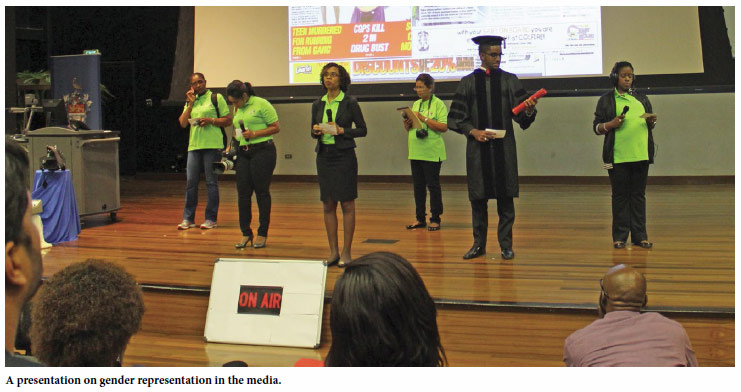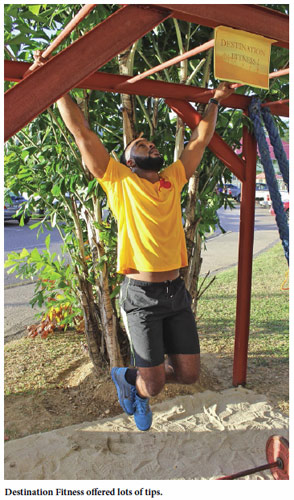

It's a common complaint that many university students appear to be confined by the walls of theory to the point that they fail as active participants when entering the world beyond their classrooms.
At The UWI, St. Augustine, the Department of Literary, Cultural and Communication Studies has been combating this perception of university students as “ivory tower” products for some time. Its latest salvo came in the form of this year’s Communication Studies Research Day event, “Third Eyes: Communication Beyond Perception.”
On April 9, final-year students of the Communication Studies degree programme showcased what can happen when theory and practice come together. The students partnered with organizations and mentors in the working world, identifying and solving communication issues within the small businesses, NGOs and corporate sector companies that they worked with.
One might muse in a similar fashion to the Departmental Head, Dr. Louis Regis, that this is one of the most effective ways to educate students.
If you walked past the Daaga Auditorium at the beginning of the event you would have been struck by the students' booth displays, which represented a wide spectrum of organizations and issues. The booths were so well displayed that one observer remarked, “this could easily have been mistaken for a trade expo at the Hyatt.”
 The eight booths featured small and medium sized businesses such as The Perfect Cup, a coffee shop on Ariapita Avenue; Look Opticals, an eye-care provider; Body By Marcus, a fitness centre; and Above Group from the advertising industry. Also in the mix were two NGOs – FEEL (Foundation for the Enhancement and Enrichment of Life) and the Blue Teddy Initiative, a movement that focuses on helping child victims of sexual violence. The eight booths featured small and medium sized businesses such as The Perfect Cup, a coffee shop on Ariapita Avenue; Look Opticals, an eye-care provider; Body By Marcus, a fitness centre; and Above Group from the advertising industry. Also in the mix were two NGOs – FEEL (Foundation for the Enhancement and Enrichment of Life) and the Blue Teddy Initiative, a movement that focuses on helping child victims of sexual violence.
Each of these organizations partnered with a group of four to five final-year students, together with a supervising tutor from the course, and they worked together to addresses communication challenges within the organization over a period of eight months. Organizations wanted help on issues as diverse as building a stronger social media presence, increasing foot traffic in stores, lifting sales, building a communication plan, and establishing a firmer, fresher brand identity.
One partner organization, Salt Water Advertising, was so pleased it offered a job to the five students who worked with them during the year.
Inside the packed Daaga Auditorium, the remaining students gave exciting group presentations on stage. One group transformed the stage into a Sunday market scene as they made their case for greater support of the Green Market in Santa Cruz. Vicki Assevero, founder and manager of the Green Market, said that she was totally pleased with the presentation and the collaboration with the students.
The Green Market was followed by a presentation on gender representation in the media, which so impressed and moved the Master of Ceremonies, Errol Fabien of Gayelle, that he announced his television channel’s intention to contribute five hours of programming time per week to the Communication Studies programme.
The audience was then informed by another student presentation of the importance of certification in the field of journalism as The UWI gets ready to launch its BA in Journalism degree. The final presentation discussed the clash between millennial culture and traditional corporate culture.
Course coordinator, Dr. Tia Smith, was brimming with pride as she noted that thinking beyond the sometimes confining walls of the classroom is an important step for students becoming socially responsible individuals.
The keynote speaker, Retired Supreme Court Justice of New York, Judge Laura Blackburne, offered some critical insight into the importance of effective communication to society.
No stranger to engaging the people, she acknowledged the presence of social injustice and the necessity of tactical, collaborative communication in overturning inequality. She asserted that the great Martin Luther King Jr. used excellent communication strategies to successfully allow many voices to be heard through nonviolent strategies.
Her advice was that while it is easy to retaliate, an act of outrage remains a mere act of outrage if the accompanying message is not effectively delivered. What’s not easy is staying in the battle and strategically organizing unified action through becoming focused on communicating in better ways.
This particular academic year students were able to move beyond the classroom and engage with the world in a greater capacity. An unfounded perception still lingers that university students lack the skills to participate in the working world, but that narrative is being transformed, just ask anyone who attended the 2015 Communication Studies Research Day.
Ariana Herbert is a student of the Communication Studies programme. |





